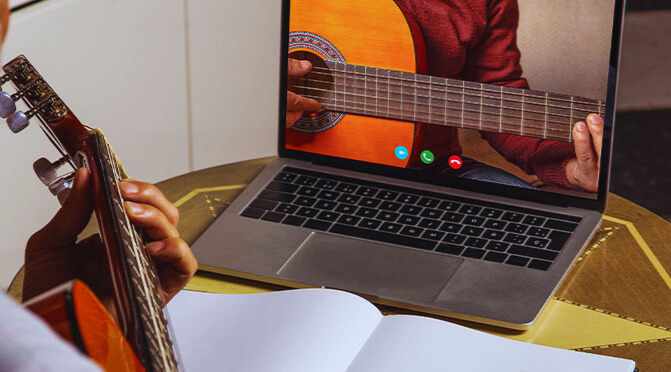Enrolling in online music classes is a convenient and flexible way to learn music from the comfort of your home. However, to truly progress and make the most of your investment, it's crucial to practice regularly between sessions. Practicing effectively is not just about repeating exercises—it's about building a strong musical foundation, improving gradually, and staying motivated.
In this blog, we’ll explore practical strategies to help you practice effectively between your online music class sessions, whether you’re learning vocals, guitar, piano, or any other instrument.

1. Create a Dedicated Practice Schedule
The first step to effective practice is setting a routine. Just like attending your online music classes at fixed times, your practice sessions should also be consistent. Choose specific time slots each day when you’re least distracted—early morning or evening often works best for focused practice.
Even 20 to 30 minutes daily can lead to significant progress if used wisely. Consistency helps build muscle memory, develop better timing, and reinforce what you learn in class.
2. Set Clear Goals for Each Practice Session
Practicing without a goal can lead to boredom or lack of progress. Before each session, ask yourself:
What did I learn in my last online music class?
What do I want to improve today?
Am I focusing on technique, theory, or performance?
Break down your goals into manageable tasks. For example:
Practice C major scale slowly and cleanly for 5 minutes
Repeat a vocal exercise with correct breathing for 10 minutes
Play a song section repeatedly to improve finger coordination
Having a goal-oriented practice session makes learning efficient and rewarding.
3. Use the Materials Provided by Your Online Music Class
Most online music classes provide learning materials like PDFs, video recordings, audio files, or sheet music. Make full use of them. Rewatch class recordings to revise lessons or spot mistakes in your performance. If your tutor shares backing tracks or vocal guides, practice along with them for timing and pitch accuracy.
Using these resources bridges the gap between online sessions and helps you internalize concepts better.
4. Focus on Quality Over Quantity
It’s tempting to think that longer practice means better results. However, effective practice is more about quality than time. Playing the same song or scale for an hour with errors won’t help as much as 20 minutes of focused, correct practice.
Use slow practice to correct finger placement, posture, or pitch. Gradually increase the tempo as you gain confidence. Always listen to yourself—record your sessions and evaluate areas of improvement.
5. Maintain a Practice Journal
Keeping a music practice journal helps track your progress. After each session, write down:
What you practiced
What went well
What needs more attention
Any questions or doubts to ask in the next class
This helps you stay organized and ensures you go into your next online music class well-prepared. Teachers also appreciate students who are mindful of their learning process.
6. Stay Motivated with Mini-Challenges
Learning music online can sometimes feel isolating. To stay engaged, give yourself mini-challenges. These could be:
Memorizing a short song in a week
Hitting a high note with proper control
Playing a section of a piece without looking at your hands
You can also join online music forums or communities where learners share their progress and inspire one another. Many online music classes have internal groups or platforms where students interact—make use of them!
7. Work on Weak Areas, Not Just Favorites
It's easy to practice songs or pieces you enjoy, but real growth comes from tackling your weaknesses. If you struggle with rhythm, spend time with a metronome. If your voice lacks pitch accuracy, practice with a tuner. If your fingers move slowly on a guitar, do targeted exercises for speed.
Use your online music teacher's feedback as a guide to identify and improve weak points. Overcoming challenges not only improves your skills but also builds confidence.
8. Take Breaks and Avoid Burnout
While regular practice is key, over-practicing can lead to fatigue and frustration. Take short breaks during practice sessions. A 5-minute rest between two 15-minute blocks can refresh your mind and prevent mistakes caused by tiredness.
Always listen to your body and mind. If you feel stuck, take a day off or do light practice like listening to music, reading about your instrument, or watching a performance for inspiration.
9. Leverage Technology for Smart Practice
Apart from online music classes, use mobile apps or tools that assist in music learning:
Metronome apps for timing
Tuner apps for pitch correction
Recording apps to track your improvement
Music theory apps to understand scales, chords, and keys
Technology, when used effectively, can enhance your independent practice and make you more self-reliant between online lessons.
Conclusion: Effective practice between your online music class sessions is the key to long-term improvement and musical mastery. With a structured approach, proper tools, and a motivated mindset, you can turn every practice session into a step forward. Remember, progress in music is not about being perfect—it's about being better than you were yesterday.
So set your goals, stick to your routine, and keep the music alive every day, even between classes!


Write a comment ...